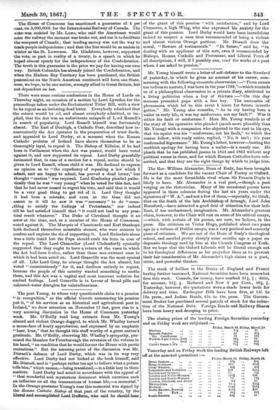There were some curious confessions in the House of Lords
on 'Thursday night, on occasion of a motion by Lord Lyveden for the proceedings taken under the Ecclesiastical Titles' Bill, with a view to its repeal as an irritating dead letter. Everybody admitted that the return would be nil, and almost everybody admitted, or im- plied, that the Act was an unfortunate escapade of Lord Russell's in search of popularity. Lord Russell himself was fortunately absent. The Earl of Denbigh, a Catholic Peer, described how in- conveniently the Act operates in the preparation of trust deeds, and appealed to Lord Derby, at a moment when the Boman Catholic prelates of Ireland have shown themselves to be so thoroughly loyal, to repeal it. The Bishop of Killaloe, if he had been in Parliament when the Act was passed, would have voted against it, and now supported its repeal. Lord Derby gracefully -intimated that, in case of a motion for a repeal, notice should be _given to Lord Russell, whose child it was. He declined to express an opinion as to "the expediency of repealing a law which I -admit, and am happy to admit, has proved a dead letter," but -thought " caution " was required. Lord Kimberley pleaded pathe- tically that he was "very young" when he voted for this Act, and that he had never ceased to regret his vote, and said that it would Are a very good thing to get rid of it. Lord Grey thought it had been a mistake, and even at the time did not .assent to it till he saw it was " necessary " to do "some- ,thing to satisfy the feelings of Protestants," nor indeed till he had satisfied himself that "it could not lead to any prac- -tical result whatever." The Duke of Cleveland thought it an -error at the time, and, as a member of the House of Commons, Toted ag,ainst it. The Marquis of Clanricarde and Earl -Stanhope both declared themselves miserable sinners, who were anxious to ,confess and expiate the sin of supporting it. Lord Redesdale alone was a little timid lest the Pope should exalt his horn in case of the repeal. The Lord Chancellor (Lord Chelmsford) cynically, -suggested that they ought to have a return of the cases in which the Act had been broken, rather than- those non-existent ones in which it had been acted on. Lord Granville was the most cynical -of all. Like Lord Grey, he always thought the Act absurd, but voted " conscientiously " for it, and declines entirely to repent, because the people of this country wanted something to soothe them, and this Act was a capital and most innocent sedative for .excited feelings. Lord Granville is in favour of bread pills and -coloured-water draughts for valetudinarians.


































 Previous page
Previous page